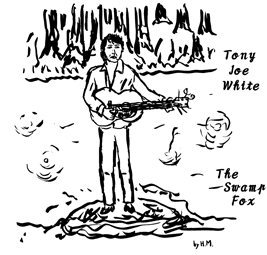

If you at first keep in your mind a singer or musician's name from each song, the name should resurrect in your memory and you should find it interesting when you hear other songs. And then you should want to dig deeper about the person and you should spread your own world of music : that's one of virtues in listening to various artists' compilations. As for me, "Atlantic Rhythm & Blues 1947-1974" is the best, which includes my one of starting points, Brook Benton's Rainy Night in Georgia. Ray Charles also read this tune in the way of a drunken man muttering to himself (it is compiled on "The Definitive Ray Charles"). While I listen to such a song and read the reviews on Amazon.com, an opinion "The writer Tony Joe White's Rainy Night in Georgia is better" catches me by the brain. It is so impressive that it's against my viewpoint at the time, "Brook Benton is the best!". And then I run across a song Polk Salad Annie when I listen to a mid-and-late '60s compilation "Chartbusters USA Volume 2". This is Tony Joe White's own biggest hit ever, which starts with country blues guitar and Tony Joe's speaking and is wrapped up in rhythm & blues or soul funkiness of horn treatments and ends with 'whomper stomper', distorted wah electric guitar. This is specially cool and knocks me out. This is well applied to by his nickname 'the Swamp Fox'. Here I impulsively want to try other Tony Joe White tunes. Simple singing and talking about his personal thought in Rainy Night in Georgia on "The Best of Tony Joe White" matches well with Tony Joe's husky and growling singing style. It makes contrast with the atmosphere Brook Benton makes by the way he magnificently sings on the stage, however, both of them are equally splendid.
Born in Louisiana of the south and inspired by black blues such as Lightnin' Hopkins or John Lee Hooker, he made his way not to nearer Memphis but to Nashville, the holy place of country music, because of his brother's advice. At first his less-countrified tunes were not accepted, though, finally he could meet with figures not so conservative in Nashville. And then it led to his securing a foothold of success with Soul Francisco released at Monument label and somehow popular in France. However, there were more renditions of his tunes than hits of his own; in addition to Rainy Night in Georgia, Dusty Springfield read Willie & Laura Mae Jones (on "Dusty in Memphis [Deluxe Edition]") with her passionate, clean voice and Elvis Presley also sang Polk Salad Annie on his live and I've Got a Thing about You Baby in the studio (both are on Japanese compilation "Country Rock").
"The Best of Tony Joe White" contains Monument sides, which are attractive for multi-genre funky country blues, and rather sophisticated Warner sides. The succession of them is clumsy and less various, though, the more you listen to it the better you feel. (After I wrote above, I found a new Rhino box set including his unreleased Monument sides but I quitted getting this expensive set. I thought it's better to get his 3 Monument ones and 3 Warner ones since these 6 cost as much as the set. I took them in my hands. "Black and White", "...Continued" and "Tony Joe" , produced by Billy Swan of Monument, are rough but building the foundation of his music to this day. While "Tony Joe White", by Peter Asher who also produced artists like James Taylor, unexpectedly leaves the mood of Monument years, "The Train I'm on" and "Homemade Ice Cream", co-produced by Tom Dowd, seem to bring his sense toward singing rather than growling or speaking in his usual way, and reflect the era of introspective singer-songwriters. If you want to choose his sharp and solid production, you should listen the Warner years : as for me, I cannot cast aside the confusion of the Monument years when various kinds of music were put in the same pot. )
He released albums "Eyes" and "Dangerous" in from the late '70s to the '80s, when everyone were likely to follow that time's trend for a hit. It shows the wavering kind since his singing style was influenced by AOR like Michael McDonald of The Doobie Brothers and he challenged disco or rap. In a sense it makes me feel the times. He seemed to be welcome in Europe including France in the 90s when many old-timers got back to their own roots. "Closer to the Truth" and "Lake Placid Blues" released in France impress you by a little sentimental and emotional guitars sound like Dire Straits. I think the latter should be more energetic. Just in the 21st century he had "The Beginning" in his own guitar and harmonica arrangements. Its lyrics and songs stay still but they must be better suited to his nature. "The Heroines" contains tasty collaborations with female singers including Shelby Lynne, Lucinda Williams and Emmylou Harris, who put higher esteems on their own roots in the country field. Although I am through with one of my music trips, it's fun to catch such a feeling on the way and it's also my pleasure to revisit the songs for seeking what I have left unheard. (2005/04/01)(2007/01/13)